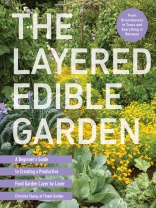Design, plant, and tend a self-sustaining, high-yielding food garden that saves space by growing plants the way nature intended—in layers.
Say goodbye to long, straight rows of vegetable plants lined up and waiting for attacks from pests and diseases, and say hello to
an interplanted polyculture paradise , filled with
layers of edible plants that outcompete weeds, share resources, and grow beautifully together .
In
The Layered Edible Garden, author and food gardening pro Christina Chung of @fluent.garden introduces
a modern approach to home food gardening that follows nature’s lead by growing plants in mixed communities, instead of in agriculture-centric monocultures.
By intentionally including
edible plants from 8 different layers (trees, sub-canopy trees, shrubs, vines, perennials, annuals, ground covers, and edible roots) in your home garden, you’ll be building a mini
“food forest” that will produce food for years to come and require
less work and
fewer resources .
With the insight found in
The Layered Edible Garden, you’ll:
- Learn how to transform your home’s landscape into an edible plant community
- Meet dozens of plants in each of the 8 layers
- Discover the many perks of growing perennial food crops that return to the garden year after year
- Find design and planting advice to make your layered edible garden as attractive as it is productive
- Be introduced to intensive planting strategies to organize plant layers in a functional and beautiful way
- Acquire info on how to establish new planting areas and how to utilize the existing garden features already present
Whether you have sun or shade, a large growing space or a small one, planting many layers of food plants together results in
a diverse, low-maintenance edible garden , filled with plants that help support each other. The future of growing food is multi-layered.
Tentang Penulis
Christina Chung of @fluent.garden creates educational content to make gardening accessible for a wide range of online audiences. After completing the Horticulture Technician Foundation program through The UBC Botanical Garden’s Horticulture Training Program, Chris served as the program’s coordinator for two years. Working as an educator, she created and taught small-scale urban food production courses. Chris’s current passion for growing perennial edible plants has led her to investigate the viability of introducing thoughtfully designed food forests or ‘layered’ plantings into residential-scale gardens in Metro Vancouver, Canada. She completed further training through Gaia College’s Organic Horticulture Specialist Program.












